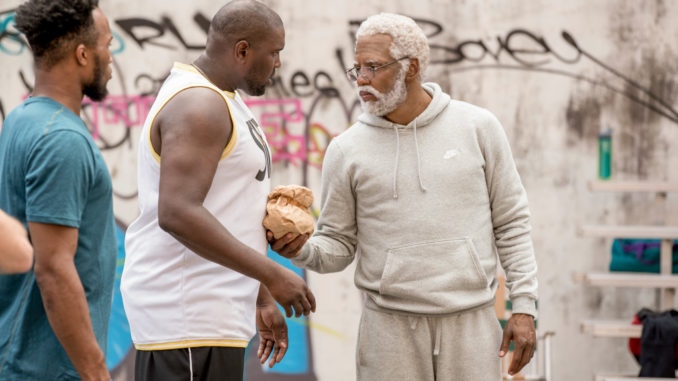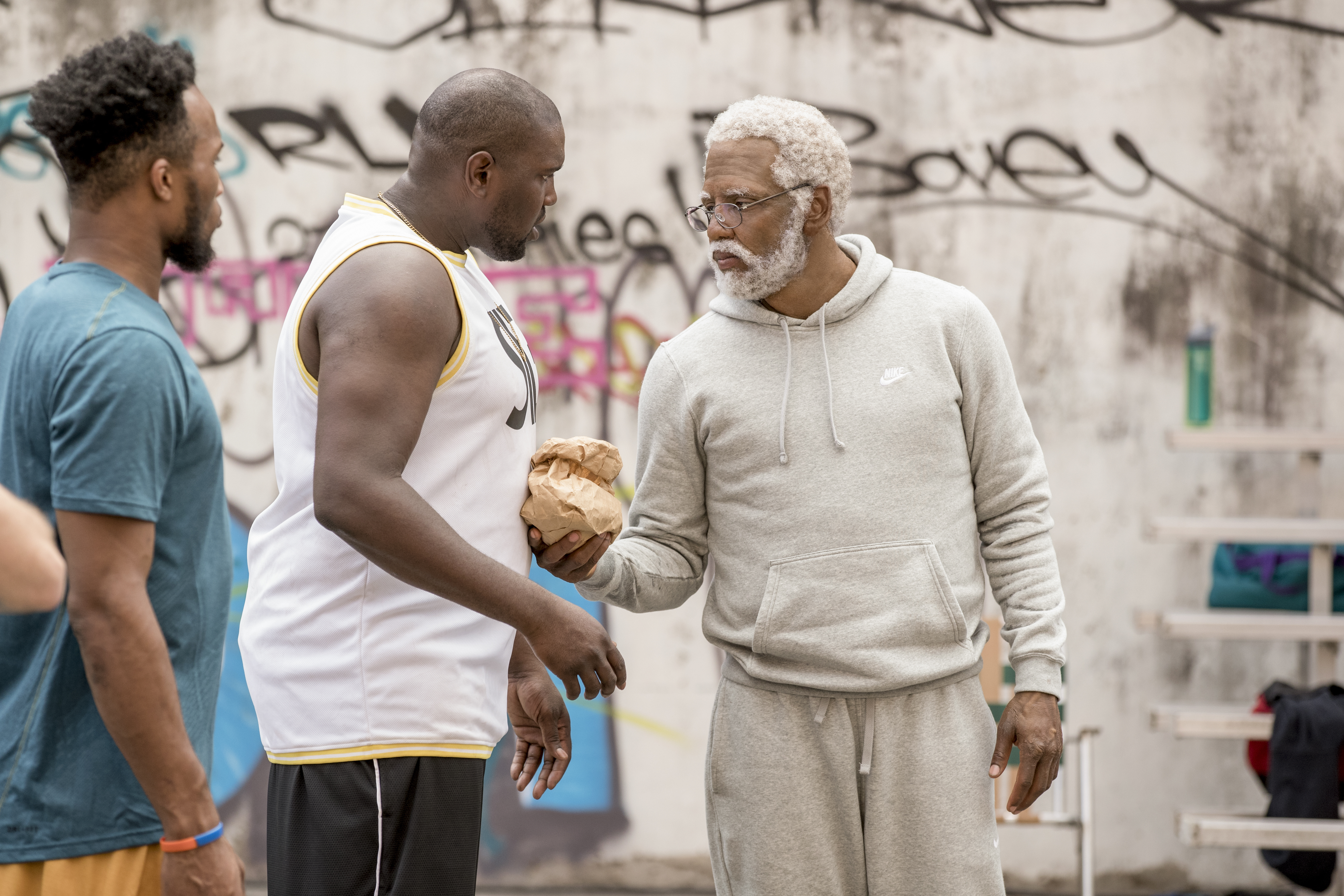
Uncle Drew had been rolling for less than 20 minutes, when it dawned on me that I’d bought a ticket to an expanded cola commercial. Celtics star point guard Kyrie Irving had just appeared as the title character, dressed in old-man prosthetic makeup. Irving’s septuagenarian Uncle Drew challenges a cocky “youngblood” — as he calls variations of this same guy throughout the film — to a game of 1-on-1. Uncle Drew concedes two quick buckets. Trash talk ensues. But as viewers, we know the hustle is already on.
We know because we’ve seen this before. In a Pepsi ad. Uncle Drew was first conceived in 2012 as inconspicuously branded content for Pepsi Max, and since has racked up more than 52 million views on the company’s YouTube page. Irving’s first scene in the film is a spot-on re-creation: Uncle Drew shows up at a court and schools a crowd of unsuspecting youngbloods with his dazzling array of streetball moves and high-flying dunks. From a marketing standpoint, the gag was wildly successful. So much so that Pepsi decided to expand it into a full-blown basketball movie.
Needless to say, it was an unnecessary venture. Uncle Drew is what you might imagine a soda ad reconceived as a feature-length film would be. The gag wears thin. The plot is predictable. Cameos are made. Fears are overcome. Lessons are learned. The villain is thwarted. The guy gets the girl. The team goes the distance. We see Shaq’s butt.
In other words, it was a sports movie.
***
Sports movies are bad. This is one of my foundational beliefs, and neither you, nor Uncle Drew, will convince me otherwise.
I understand this is not a popular opinion. Please, do email to tell me how much you disagree. But I am sorry to inform you that you’re wrong.
There are exceptions to the “Sports Movies Are Bad” credo, of course — a few of which will be covered later — but for the most part, movies about sports are cliche and unoriginal, predictable and uninspired, brimming with paint-by-numbers melodrama and overwrought with heavy-handed morals about perseverance and what it means to be a man.
There’s a reason Pepsi could turn branded content into a movie that’s now projecting to push $15 million in opening-weekend gross. Our expectations for sports movies are so low, that even an expanded, viral soda ad with a few NBA stars suffices.
It doesn’t have to be this way. Sports are factories of drama, replete with action and overflowing with stories both amazing and unexpected, and we’ve largely wasted them on film. We deserve so much better than a world where Rudy is considered one of America’s great sports movies.
Before Uncle Drew, the last sports movie I’d seen in theaters was The Wrestler, circa 2008. (A fantastic film, I should point out.) But this week, in the lead-up to Uncle Drew’s premier, I decided to further explore the root of my deep discontent with sports and cinema. I solicited friends and Twitter followers to give me a range of movies they thought might prove me wrong. And then, armed with a six-pack, a box of pizza, and a foam finger (not really), I dove headfirst into a one-day marathon of shallow 90’s sports movie plots, to prove once and for all, that sports movies are worse than you think they are.
RUDY (1993)
Daniel “Rudy” Ruettiger is not very good at football. He stands a few inches over 5 feet and weighs “100 and nothin”. But he tries very hard and wants it very badly and loves Notre Dame so, so much … and, apparently, that is enough to join the Notre Dame football team. Oh, and did I mention he plays defensive end?
Rudy’s brother, naturally suspicious of this arrangement, speaks for all of us: “If you’re a part of that team,” he told him, “my opinion of Notre Dame football just hit the (expletive).”
For a film that so regularly dips its toes into nauseating Notre Dame propaganda, it sure has a low opinion of the university’s athletic standards. There is no explanation for why someone so small and unathletic would make the roster of an elite football team. Never once in the movie does Rudy actually try to get better at football.
His whining, however, is prevalent throughout. It’s so convincing that Notre Dame’s coaches agree to let Rudy dress for one game, in spite of the many other walk-ons who are more deserving.
When a new coach, Dan Devine, takes over, he’s then portrayed as callous for not wanting a terrible football player on his team. Rudy is left off the final dress list and quits. Another great lesson.
But he will whine his way back onto the team, dressing in full uniform for practice to be welcomed with a bizarre standing ovation for a 5-foot-4 walk-on who just threw a temper tantrum about his playing time. Still, every major player on the team threatens to quit if he doesn’t dress. When Devine gives in, the players go even further, dialing up a late-game halfback pass instead of a kneeldown, just to give Rudy one shot at a defensive play, which is obviously a sack, and obviously, he’s carried off the field on his teammates’ shoulders.
I don’t care if it’s a true story. Rudy is the worst.
ANY GIVEN SUNDAY, 1999
Upon re-watching Oliver Stone’s twitchy football saga, I was ready to accept its flaws. I could get over the overacting and even look past the ridiculous action scenes. Amid the blather about masculinity and honor and interspersed between roaring lion sound effects and pulsating, voyeuristic shots of on-field savagery, there are legitimate, deep questions about the darker side of professional football. Painkillers, stadium leverage, concussions, race — all of these subjects are covered, at some point, in between Any Given Sunday’s maniacal acid trip, on-field scenes.
I was on-board. Until one scene, when some dude’s eyeball fell out on the field.
An eyeball? I mean, come on now. I missed the next 20 minutes of the movie wondering whose idea that was.
Once I recovered, I’d stumbled my way into a conventional football movie. With his Miami Sharks at their breaking point, Al Pacino gave a speech to pump up his team about how life, like football, is a game of inches. Everything in sports movies is a metaphor for life.
You know what happens next. They overcame adversity on the field. The young backup quarterback put it all together. The old quarterback accepted his new role. The coach learned that he needed to embrace change. Football movies, even ones with detached eyeballs and lightning bolt sound effects, just can’t resist winding up right back where they started.
BULL DURHAM, 1988
I’m not sure I’ve ever seen a sports movie that ended quite like Bull Durham. While the climax of most sports movies finds us in some dramatic, in-game moment, Bull Durham wraps with a multi-scene, PG-13 sex montage between Kevin Costner and Susan Sarandon, scored by a sultry jazz saxophone. The reality is that Bull Durham isn’t a sports movie about minor league baseball, so much as it’s a raunchy romantic comedy masquerading as one.
That is perhaps the best compliment I can give it. The best sports movies — which is to say very few — understand that the sports are best served as a vehicle for something else. Bull Durham, at its heart, is more love story than baseball movie. The backdrop just happens to be one season with the Single-A Durham Bulls.
The first time Crash Davis (Kevin Costner) and Ebby Calvin LaLoosh (Tim Robbins) meet, they’re already fighting over Sarandon for no apparent reason other than to prove their manliness. Davis, the veteran who was sent down to the Single-A Durham Bulls to mentor LaLoosh, the hotshot prospect, challenges the pitcher to throw a baseball, instead of a punch.
“Come on rook,” Costner says. “Show us that million-dollar arm.” LaLoosh’s wild throw breaks a nearby window, and Crash responds with the cheesiest burn in the history of sports movies, “Ball Four,’ before punching LaLoosh in the face.
“I’m Crash Davis. I’m your catcher, and you just got Lesson No. 1,” Costner says.
OK, I’ll admit, I was hooked.
THE SANDLOT, 1993
Overfilled on cliches, I finished my marathon on a movie I adored as a kid. And as Smalls’ towering home run soared over the fence, it dawned on me that, for all of my trolling, some sports movies are just untouchable. As bad as they may be, the nostalgia they often evoke is a powerful, sometimes brainwashing force. For me, that’s true of The Sandlot. I can’t bring myself to pick it apart. It’s like watching Space Jam and criticizing it for Michael Jordan’s acting.
In this case, I won’t be the guy to complain about how fortuitous it is to have a former member of the 1928 Yankees living in the house where your stepdad’s autographed Babe Ruth ball happened to land. (OK, so maybe I will.)
But as I learned on my marathon, sports — or sports movies, at least — are about making impossible dreams come true!
And for their next impossible dream? Please, for the love of the Great Bambino, make a better sports movie.
Take Our Poll
(function(d,c,j){if(!d.getElementById(j)){var pd=d.createElement(c),s;pd.id=j;pd.src=’https://www.pe.com/wp-content/plugins/polldaddy/js/polldaddy-shortcode.js’;s=d.getElementsByTagName(c)[0];s.parentNode.insertBefore(pd,s);} else if(typeof jQuery !==’undefined’)jQuery(d.body).trigger(‘pd-script-load’);}(document,’script’,’pd-polldaddy-loader’));






